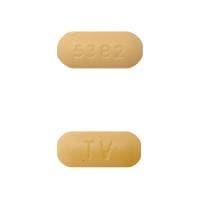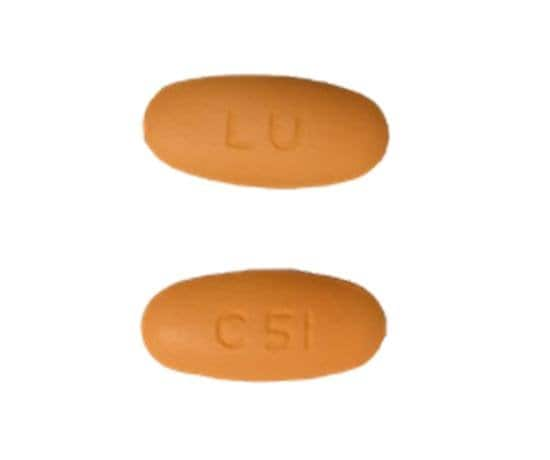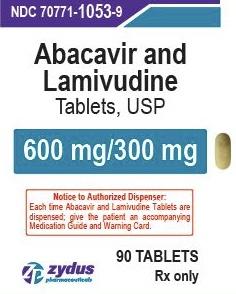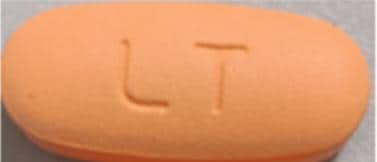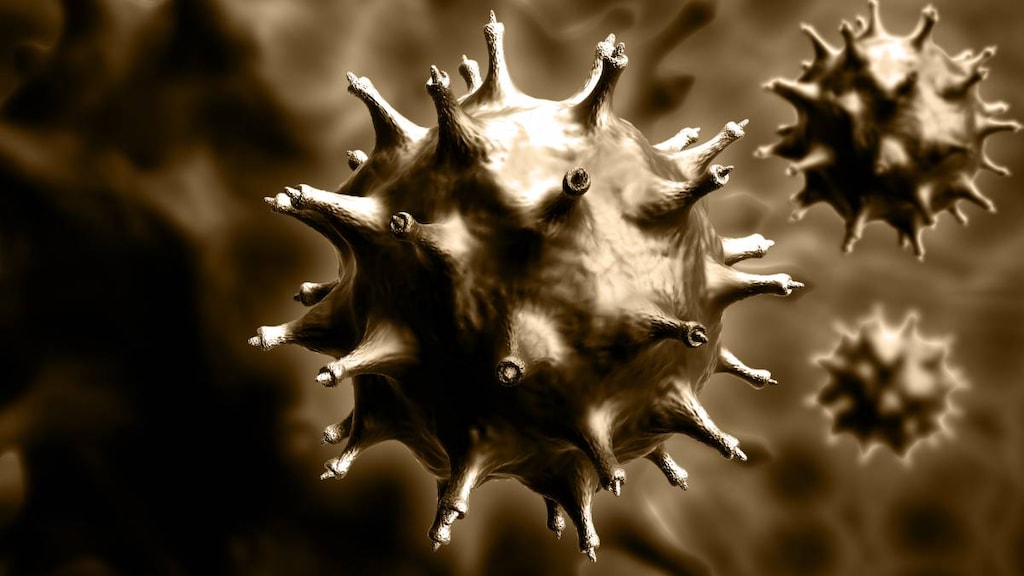Boxed Warning
Hypersensitivity reactions:
Serious and sometimes fatal hypersensitivity reactions, with multiple organ involvement, have occurred with abacavir, a component of abacavir/lamivudine.
Patients who carry the HLA-B*5701 allele are at a higher risk of a hypersensitivity reaction to abacavir; although, hypersensitivity reactions have occurred in patients who do not carry HLA-B*5701 allele.
Abacavir is contraindicated in patients with a prior hypersensitivity reaction to abacavir and in HLA-B*5701–positive patients. All patients should be screened for the HLA-B*5701 allele prior to initiating therapy with abacavir/lamivudine or reinitiation of therapy with abacavir/lamivudine, unless patients have a previously documented HLA-B*5701 allele assessment. Discontinue abacavir/lamivudine immediately if a hypersensitivity reaction is suspected, regardless of HLA-B*5701 status and even when other diagnoses are possible.
Following a hypersensitivity reaction to abacavir/lamivudine, never restart abacavir/lamivudine or any abacavir-containing product because more severe symptoms, including death, can occur within hours. Similar severe reactions have also occurred rarely following the reintroduction of abacavir-containing products in patients who have no history of abacavir hypersensitivity.
Exacerbations of hepatitis B:
Severe acute exacerbations of hepatitis B have been reported in patients who are co-infected with hepatitis B virus (HBV) and HIV-1 and have discontinued lamivudine, which is a component of abacavir/lamivudine. Hepatic function should be closely monitored with both clinical and laboratory follow-up for at least several months in patients who discontinue abacavir/lamivudine and are coinfected with HIV-1 and HBV. If appropriate, initiation of antihepatitis B therapy may be warranted.
Dosage Forms
Excipient information presented when available (limited, particularly for generics); consult specific product labeling.
Tablet, Oral:
Epzicom: Abacavir 600 mg and lamivudine 300 mg [contains fd&c yellow #6 (sunset yellow)]
Generic: Abacavir 600 mg and lamivudine 300 mg
Pharmacology
Mechanism of Action
Nucleoside reverse transcriptase inhibitor combination.
Abacavir is a guanosine analogue which is phosphorylated to carbovir triphosphate which interferes with HIV viral RNA-dependent DNA polymerase resulting in inhibition of viral replication.
Lamivudine is a cytosine analog. After lamivudine is triphosphorylated, the principle mode of action is inhibition of HIV reverse transcription via viral DNA chain termination; inhibits RNA-dependent DNA polymerase activities of reverse transcriptase.
Use: Labeled Indications
HIV-1 infection: Treatment of HIV-1 infection in combination with other antiretroviral agents
Contraindications
Hypersensitivity to abacavir, lamivudine, or any component of the formulation; patients who have the HLA-B*5701 allele; moderate or severe hepatic impairment
Canadian labeling: Additional contraindications (not in US labeling): Hepatic impairment (regardless of severity)
Dosage and Administration
Dosing: Adult
HIV-1 treatment: Oral: One tablet (abacavir 600 mg and lamivudine 300 mg) once daily. Note: Abacavir/lamivudine is a component of a recommended initial regimen with dolutegravir for antiretroviral (ARV) treatment-naive patients who are HLA B*5701 negative (HHS [adult] 2017).
Dosing: Pediatric
Note: Use in combination with other antiretroviral agents.
HIV-1 infection, treatment:
Children and Adolescents weighing <25 kg: Not recommended; product is a fixed-dose combination.
Children and Adolescents weighing ≥25 kg: Oral: 1 tablet daily
Administration
May be administered with or without food.
Storage
Store at 25°C (77°F); excursions permitted to 15°C to 30°C (59°F to 86°F).
Abacavir and Lamivudine Images
Drug Interactions
Cabozantinib: MRP2 Inhibitors may increase the serum concentration of Cabozantinib. Monitor therapy
Cladribine: Agents that Undergo Intracellular Phosphorylation may diminish the therapeutic effect of Cladribine. Avoid combination
Emtricitabine: LamiVUDine may enhance the adverse/toxic effect of Emtricitabine. Avoid combination
Methadone: May diminish the therapeutic effect of Abacavir. Abacavir may decrease the serum concentration of Methadone. Monitor therapy
Orlistat: May decrease the serum concentration of Antiretroviral Agents. Monitor therapy
Protease Inhibitors: May decrease the serum concentration of Abacavir. Monitor therapy
Sorbitol: May decrease the serum concentration of LamiVUDine. Management: When possible, avoid chronic coadministration of sorbitol-containing solutions with lamivudine, but if this combination cannot be avoided, monitor patients more closely for possible therapeutic failure associated with decreased lamivudine exposure. Consider therapy modification
Trimethoprim: May increase the serum concentration of LamiVUDine. Monitor therapy
Adverse Reactions
See individual agents as well as other combination products for additional information. Rates of adverse reactions were defined during combination therapy with other antiretrovirals.
1% to 10%:
Central nervous system: Abnormal dreams, anxiety, depression, dizziness, fatigue, headache, insomnia, malaise, migraine, vertigo
Dermatologic: Skin rash
Gastrointestinal: Abdominal pain, diarrhea, gastritis
Hypersensitivity: Hypersensitivity (including multiorgan failure and anaphylaxis; ≤9%; higher incidence in subjects carrying the HLA-B*5701 allele)
Miscellaneous: Fever
<1%, postmarketing, and/or case reports: Abnormal breath sounds, alopecia, anemia (including pure red cell aplasia and severe anemias progressing on therapy), aplastic anemia, erythema multiforme, exacerbation of hepatitis B, hepatitis, hyperglycemia, immune reconstitution syndrome, increased creatine phosphokinase, lactic acidosis, liver steatosis, lymphadenopathy, myasthenia, paresthesia, peripheral neuropathy, redistribution of body fat, rhabdomyolysis, seizure, splenomegaly, Stevens-Johnson syndrome, stomatitis, weakness, wheezing
Warnings/Precautions
Concerns related to adverse effects:
- Hypersensitivity reactions: [US Boxed Warning]: Serious and sometimes fatal hypersensitivity reactions have occurred with abacavir, a component of abacavir/lamivudine. Patients who carry the HLA-B*5701 allele are at a higher risk for a hypersensitivity reaction to abacavir, although hypersensitivity reactions have occurred in patients who do not carry the HLA-B*5701 allele. All patients should be screened for the HLA-B*5701 allele prior to initiating or reinitiation of therapy unless patients have had a previously documented HLA-B*5701 allele assessment. Discontinue abacavir/lamivudine if a hypersensitivity reaction is suspected. Abacavir is contraindicated in patients who have the HLA-B*5701 allele or in patients with a prior hypersensitivity reaction to abacavir. Reintroduction of any abacavir-containing product can result in life-threatening or fatal hypersensitivity reactions, even in patients who have no history of hypersensitivity to abacavir therapy. Such reactions can occur within hours. An allergy to abacavir should be documented in the medical record of allele-positive patients. Reactions usually occur within 9 days of starting abacavir; ~90% occur within 6 weeks, although these reactions may occur at any time during therapy (HHS [adult] 2017). These reactions usually include signs or symptoms from two or more of the following: Fever, skin rash, constitutional symptoms (malaise, fatigue, aches), respiratory symptoms (eg, pharyngitis, dyspnea, cough), and GI symptoms (eg, abdominal pain, diarrhea, nausea, vomiting). Other signs and symptoms include lethargy, headache, myalgia, edema, abnormal chest x-ray findings, arthralgia and paresthesia. Anaphylaxis, liver failure, renal failure, hypotension, adult respiratory distress syndrome, respiratory failure, myolysis, and death have occurred in association with hypersensitivity reactions. Physical findings (lymphadenopathy, mucous membrane lesions, and rash [maculopapular, urticarial or variable]) may occur. Erythema multiforme has also been reported. Laboratory abnormalities (eg, elevated liver function tests, elevated creatine phosphokinase, elevated creatinine, and lymphopenia) may occur. Abacavir/lamivudine should be permanently discontinued if hypersensitivity cannot be ruled out, even when other diagnoses are possible and regardless of HLA-B*5701 status. Abacavir/lamivudine SHOULD NOT be restarted because more severe symptoms may occur within hours, including LIFE-THREATENING HYPOTENSION AND DEATH. If abacavir/lamivudine is restarted following an interruption in therapy not associated with symptoms of a hypersensitivity reaction, carefully evaluate the patient for previously unsuspected symptoms of hypersensitivity. Do not restart if hypersensitivity is suspected or cannot be ruled out regardless of HLA-B*5701 status. If abacavir/lamivudine is restarted, continually monitor for symptoms of a hypersensitivity reaction. Make the patient aware that reintroduction should only take place if medical care is readily accessible.
- Immune reconstitution syndrome: Patients may develop immune reconstitution syndrome resulting in the occurrence of an inflammatory response to an indolent or residual opportunistic infection during initial HIV treatment or activation of autoimmune disorders (eg, Graves’ disease, polymyositis, Guillain-Barré syndrome) later in therapy; further evaluation and treatment may be required.
- Lactic acidosis/hepatomegaly: Lactic acidosis and severe hepatomegaly with steatosis, including fatal cases, have been reported with the use of nucleoside analogues and other antiretrovirals. Female gender and obesity may increase the risk for development. Suspend treatment in any patient who develops clinical or laboratory findings suggestive of lactic acidosis or hepatotoxicity (transaminase elevation may/may not accompany hepatomegaly and steatosis).
Disease-related concerns:
- Coronary heart disease: Use has been associated with an increased risk of MI in some cohort studies (Elion 2018; HHS [adult] 2017). Consider using with caution in patients with risks for coronary heart disease and minimizing modifiable risk factors (eg, hypertension, hyperlipidemia, diabetes mellitus, and smoking) prior to use.
- Chronic hepatitis B: [US Boxed Warning]: Severe acute exacerbations of hepatitis B have been reported in patients who are co-infected with hepatitis B virus (HBV) and HIV-1 and have discontinued lamivudine, which is 1 component of abacavir/lamivudine. Monitor patients closely for several months following discontinuation of therapy for chronic hepatitis B; clinical exacerbations may occur. Lamivudine-resistant HBV variants have been reported in coinfected patients using lamivudine as part of an antiretroviral regimen.
- Hepatic impairment: Due to fixed dose of combination product, use is not recommended with mild hepatic impairment; use in patients with moderate or severe hepatic impairment is contraindicated.
- Renal impairment: Due to fixed dose of combination product, use is not recommended with renal impairment (CrCl <50 mL/minute).
Concurrent drug therapy issues:
- Drug-drug interactions: Potentially significant interactions may exist, requiring dose or frequency adjustment, additional monitoring, and/or selection of alternative therapy. Consult drug interactions database for more detailed information.
- Duplicate therapy: Concomitant use of other abacavir or lamivudine-containing products with the fixed dose combination product should be avoided.
- Emtricitabine: Concomitant use of emtricitabine-containing products should be avoided.
Other warnings/precautions:
- Appropriate use: Do not use abacavir and lamivudine (plus efavirenz, raltegravir, ritonavir- or cobicistat-boosted atazanavir, or ritonavir- or cobicistat-boosted darunavir) in adolescent and adult HIV-1 patients with a pre-ART HIV RNA >100,000 copies/mL (HHS [adult] 2017).
Monitoring Parameters
Amylase, bilirubin, blood glucose, serum creatine kinase, liver enzymes, hematologic parameters, triglycerides, viral load, and CD4 count; HLA-B*5701 genotype status prior to initiation of therapy; signs and symptoms of hypersensitivity.
Pregnancy
Pregnancy Considerations
The Health and Human Services (HHS) perinatal HIV guidelines consider abacavir in combination with lamivudine to be a preferred nucleoside reverse transcriptase inhibitor combination for pregnant females living with HIV who are antiretroviral-naive, who have had antiretroviral therapy (ART) in the past but are restarting, who require a new ART regimen (due to poor tolerance or poor virologic response of current regimen), and who are not yet pregnant but are trying to conceive. In addition, females who become pregnant while taking abacavir/lamivudine may continue if viral suppression is effective and the regimen is well tolerated. Do not use in females who are positive for the HLA-B*5701 allele. This backbone is not recommended with atazanavir/ritonavir or efavirenz if pretreatment HIV RNA is >100,000 copies/mL (HHS [perinatal] 2019).
Refer to individual monographs for additional information.
Patient Education
What is this drug used for?
- It is used to treat HIV infection.
Frequently reported side effects of this drug
- Headache
- Trouble sleeping
- Loss of strength and energy
- Nausea
- Diarrhea
Other side effects of this drug: Talk with your doctor right away if you have any of these signs of:
- Allergic reaction with organ failure like fever, rash, fatigue, flu-like signs, nausea, vomiting, diarrhea, abdominal pain, sore throat, cough, or trouble breathing
- Liver problems like dark urine, fatigue, lack of appetite, nausea, abdominal pain, light-colored stools, vomiting, or yellow skin
- Lactic acidosis like fast breathing, fast heartbeat, abnormal heartbeat, vomiting, fatigue, shortness of breath, severe loss of strength and energy, severe dizziness, feeling cold, or muscle pain or cramps
- Pancreatitis like severe abdominal pain, severe back pain, severe nausea, or vomiting
- Kidney problems like unable to pass urine, blood in the urine, change in amount of urine passed, or weight gain
- Severe dizziness
- Passing out
- Chest pain
- Depression
- Mouth sores
- Muscle pain
- Swollen glands
- Muscle weakness
- Joint pain
- Burning or numbness feeling
- Swelling
- Infection
- Signs of a significant reaction like wheezing; chest tightness; fever; itching; bad cough; blue skin color; seizures; or swelling of face, lips, tongue, or throat.
Note: This is not a comprehensive list of all side effects. Talk to your doctor if you have questions.
Consumer Information Use and Disclaimer: This information should not be used to decide whether or not to take this medicine or any other medicine. Only the healthcare provider has the knowledge and training to decide which medicines are right for a specific patient. This information does not endorse any medicine as safe, effective, or approved for treating any patient or health condition. This is only a brief summary of general information about this medicine. It does NOT include all information about the possible uses, directions, warnings, precautions, interactions, adverse effects, or risks that may apply to this medicine. This information is not specific medical advice and does not replace information you receive from the healthcare provider. You must talk with the healthcare provider for complete information about the risks and benefits of using this medicine.
